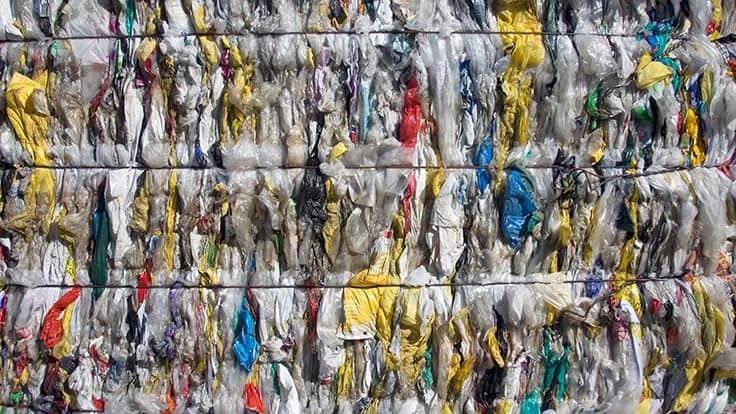
Dreamstime
The Materials Recovery For the Future (MRFF) consortium has announced that its pilot research report demonstrates the successful collection, separation and preparation for recycling of flexible plastic packaging (FPP). The pilot research was performed in partnership with J.P. Mascaro & Sons at the TotalRecycle material recovery facility (MRF) in Birdsboro, Pennsylvania.
Resource Recycling Systems (RRS) prepared a report on the pilot research. According to the report, FPP can be efficiently captured in a large, single-stream MRF and processed into a commodity bale, known as rFlex, for reuse in a variety of markets while diverting plastic from landfills.
The report also identifies more than a dozen end-market opportunities for FPP. Building envelope products such as roofing materials represent the highest volume and most immediate end market opportunities. Other high-volume opportunities for using rFlex include pallets and railroad ties, where recycled plastic can serve as a durable alternative to traditional wood.
Within one year of installing FPP sortation equipment at the TotalRecycle MRF, four of the five sortation performance goals established for the pilot demonstration were achieved, and the program continues to progress toward achieving the fifth goal, according to RRS. The five pilot research goals include:
- reduce the amount of FPP going into fiber products, even with increased FPP in feedstocks;
- minimize paper in the rFlex product bale;
- reduce fiber quality control staff by 25 percent and reallocate that staff to other job functions in the MRF;
- integrate the FPP recovery system into TotalRecycle’s existing MRF control system; and
- capture at least 90 percent of FPP.
According to the report, the last goal of capturing at least 90 percent FPP needs improvement as the pilot project achieved a 74 percent capture rate in February 2020 testing. The report states that additional equipment tuning and a minor upgrade are in process to help meet this goal.
“It’s critically important to find financially viable opportunities and markets for rFlex bales,” says Susan Graff, MRFF research director and vice president at RRS. “Our hope is that the pilot research serves as a valuable data set to help other MRFs and communities economically recycle FPP while making cleaner paper bales. By working together to update sorting equipment, municipalities and businesses can support better quality recycling and meet commitments to buy more recycled-content products.”
“It’s exciting to be a part of this important research pilot in FPP recycling and see the innovative process be both successfully integrated in our facility and well adopted by our communities,” says Joseph Mascaro Sr., director of recycling and sustainability at J.P. Mascaro & Sons.
Click here for the full report.
Latest from Waste Today
- WM of Pennsylvania awarded RNG vehicle funding
- US Composting Council executive director announces retirement
- Fuzion acquires Elite Roll-Off Services
- Los Angeles County files lawsuit against Chiquita Canyon Landfill operators
- Lux Research questions hydrogen’s transportation role
- Interstate Waste marks 25 years with record growth, strategic acquisitions
- Hauler Hero announces $10M in seed funding
- SECCRA signs up for landfill gas-to-energy system





